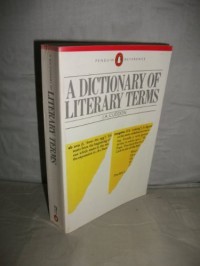
Review: A Dictionary of Literary Terms by J. A. Cuddon

Added Oct 13, 2014: This was originally something I was going to return to and finish, but that was back before this book was packed up into storage. And the annoying part is that what I was dying to post quotes from was the part on pornography, which had all sorts of fun examples from historic texts (many of which would seem wildly tame now).
Anyway, if you ever bump into this book, buy it if you're an English major because even if you don't have a concrete purpose for any of the information in your various classes and papers, you will definitely enjoy poking around in here. And if you're not an English major take a look anyway - you might find enough to convince you to read more. Especially if you love discovering new words and their origins.
........................................................
These two similar words also seemed vaguely seasonal, though not exactly in the definition (nothing scary or spooky here):
ghostword (p. 286): A term invented by W. W. Skeat, the great 19th c. editor of medieval texts, to describe words which have no real existence. Such spurious words are often the result of inadvertent errors made by copyists, printers and editors. [wikipedia - which gives examples]
phantom word (p. 503): A word that exists through the error of a scribe, printer or lexicographer, or merely through some corruptive influence. Examples are: willy-nilly for will he? nill he?; whatnot; dacious for audacious; obstropolous for obstreperous; brecksus for breakfast. Bacon and eggs and ham and eggs are inclined to appear on European menus as bekendecks and hemenex, and in other variations.
Randomly the words bekendecks and hemenex don't seem to occur often - that I could dig up via google anyway.
Seasonal link I bumped into: World Wide Words on Ghoulies and Ghosties
***********************************************************************************
Wait, is she really going to review a dictionary?! Answer: er, sort of.
Actually this is a confession. Once there was an English major who Alright, alright, back when I was an English major and was in the middle of final exam period I had this habit of getting ridiculously stressed, yet at the same time completely unable to concentrate on my studies/writing. This might have had something to do with either not taking a break after hours of studying, or perhaps it was spending the hours prior to studying worrying-about-studying.
The cure (well, one of them) was to read bits of this Dictionary of Literary Terms. Because it's full of all sorts of obscure facts that - no matter how much of a "omg I LOVE this stuff" English major you are/were - you will not have heard of everything in this book (not in only four years of undergrad that is), there's always a surprise somewhere. And it's a book that, while I was reading it, I could tell myself that I was still studying. Yes, I was totally lying to myself. Sometimes you have to do that, to get your anxieties to STFU.
And now to quote a bit over the next few days to get you to see why this is such an interesting text. I'll not quote the entire entry, because some of them can go on for pages. But I'll give you a bit of info and then a wikipedia link if you're dying for more info.
First this quote, that the goth in me (and I was such a lil 80s goth, Siouxsie makeup and all) just adored:
graveyard school of poetry (p. 293): The poets who have been put into this school wrote a type of mournfully reflective poetry with emphasis on the brevity of life and the sepulchral (and the hope of immortality) which had some vogue in 18th c. England, and in the latter half of the century was a widespread phenomenon in Europe. ...One of the earliest examples is Thomas Parnell's Night-Piece on Death (1721). The best known works are Edward Young's Night Thoughts (1742) [Gutenberg] and Robert Blair's The Grave (1743) [Bartleby.com]. Some would include Gray's Elegy (1750) and Ugo Foscolo's De' Sepolcri (1807)[Classical Italian], but the general opinion seems to be that these two poems are not typical of the graveyard school. Indeed, they transcend its limitations. [wikipedia, Literary Gothic]
Poems are all linked to the full work or wikipedia page if they're wildly long. (Do not miss checking out the wikipedia page linked for dear Ugo - check out that portrait! And the elaborately frilled shirt!) And all of that is good scholarly fodder for Halloween of course. [Confessional aside: I may also have sat my lil goth self down in a graveyard once or twice in the fall, just to read this sort of poetry. And then take photos of the gravestones. Yes, I giggle over that image too. But I still take cemetery photos.]
 8
8
 3
3















